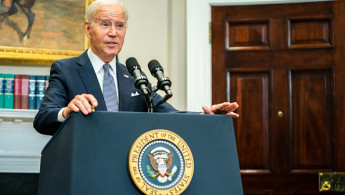Israel, Saudi Arabia normalisation 'a long way off', Biden says, despite years-long speculations
Israel and Saudi Arabia are a long way from a normalisation agreement that would involve a defence treaty and a civilian nuclear program from the United States, US President Joe Biden said in a CNN interview broadcast on Sunday.
US officials have been negotiating in a bid to reach an elusive normalisation deal between the two countries.
"We're a long way from there. We got a lot to talk about," Biden said in an interview with "Fareed Zakaria's GPS."
Israel's energy minister voiced opposition last month to the idea of Saudi Arabia developing a civilian nuclear programme as part of any US-mediated forging of relations between the countries.
Biden pointed to Saudi Arabia's decision, on the eve of his visit to the kingdom last summer, to open its airspace to all air carriers, paving the way for more overflights to and from Israel.
Israel’s far-right, ultra-nationalist government has acknowledged setbacks in the normalisation efforts, amid Saudi censure of its policies toward Palestinians.
Riyadh has repeatedly echoed the long-standing Arab League sentiment that normalisation with Israel would not occur until Palestinians were granted their own independent state. Though rumours of potential diplomatic ties between the two countries have persisted in recent years, particularly in the aftermath of the controversial Abraham Accords which saw Morocco, the UAE and Bahrain establish ties with Israel in 2020.
The Arab states' normalisation of ties with Tel Aviv sparked intense backlash in much of the Arab world, particularly among Palestinians who deemed the move a betrayal to their cause, as Israel continues to occupy and besiege Palestinian land.
However, Foreign Minister Eli Cohen sounded a hopeful note about the rare participation of an Israeli delegation at a Riyadh-hosted football video-gaming tournament over the weekend.
"I commend the delegation’s inclusion," he told Israel’s Army Radio earlier on Sunday. "Ultimately we want to reach a state of full relations (with Saudi Arabia) - meaning cooperation on economic matters, intelligence, tourism, flights, et cetera - and I reckon this will happen sooner or later."
The Israel Football Association, which is managing the delegation at the FIFA World Cup Riyadh 2023, said its participation was enabled by Riyadh’s agreement to allow in all comers - not any explicit arrangement between the Saudi and Israeli governments.
The US president also noted efforts toward a permanent ceasefire in Yemen, a conflict that has killed tens of thousands of people and has widely been seen as a proxy war between regional foes Saudi Arabia and Iran.
"So, we're making progress in the region. And it depends upon the conduct and what is asked of us for them to recognize Israel," Biden said in the interview.
"Quite frankly, I don't think they have much of a problem with Israel. And whether or not we would provide a means by which they could have civilian nuclear power and/or be a guarantor of their security, that's - I think that's a little way off."
Israel has said it expected to be consulted by Washington on a US-Saudi deal affecting its national security. Israel, which is outside the voluntary Non-Proliferation Treaty (NPT) and has no nuclear energy, is widely believed to have atomic weaponry.
(Reuters)





 Follow the Middle East's top stories in English at The New Arab on Google News
Follow the Middle East's top stories in English at The New Arab on Google News


